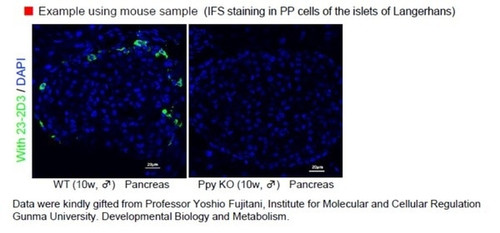-

Anti-HA-tag (6B3) Mouse IgG MoAb 1
HA-tag is a synthetic peptide corresponding to 9 amino acid residues (YPYDVPDYA) of the influenza virus hemagglutinin (HA). HA-tag is widely used as an epitope tag for the fusion protein. Using an anti-HA-tag antibody, HA-tag fusion protein can be...
Add to Cart$136.00 -

Anti-HA-tag (6B3) Mouse IgG MoAb
HA-tag is a synthetic peptide corresponding to 9 amino acid residues (YPYDVPDYA) of the influenza virus hemagglutinin (HA). HA-tag is widely used as an epitope tag for the fusion protein. Using an anti-HA-tag antibody, HA-tag fusion protein can be...
Add to Cart$567.00 -

Anti-Human G-CSF (4-12-2) Mouse IgG MoAb 1
G-CSF (Granulocyte Colony Stimulating Factor) is cytokine which accelerates differentiation and multiplication of neutrophilic precursor cell. It is reported that G-CSF is produced in such as fibroblast and endothelial cell, and that the multiplication...
Add to Cart$136.00 -

Anti-PP (Pancreatic Polypeptide) (23-2D3) Mouse IgG MoAb 1
Pancreatic Polypeptide (PP) is 36 amino acid polypeptide that is secreted by PP cells (F cells or γ cells) of the islets of Langerhans of pancreas and it is classified as NPY family peptide along with Peptide YY (PYY) and Neuropeptide Y...
Add to Cart$136.00 -

Anti-PP (Pancreatic Polypeptide) (23-2D3) Mouse IgG MoAb
Pancreatic Polypeptide (PP) is 36 amino acid polypeptide that is secreted by PP cells (F cells or γ cells) of the islets of Langerhans of pancreas and it is classified as NPY family peptide along with Peptide YY (PYY) and Neuropeptide Y...
Add to Cart$567.00 -

PD-1
Programmed Death 1 (PD-1) is a member of the CD28/CTLA-4 family of T-cell regulators, expressed as a co-receptor on the surface of activated T-cells, B-cells, and macrophages. New studies have suggested that the PD-1/PD-L1 signaling pathway may be linked...
Add to Cart$421.00 -

Her2/Neu
The Her2/Neu (c-erbB-2) proto-oncogene is a transmembrane receptor tyrosine kinase that is clinically indicated in a number of carcinomas. Overexpression of theHer2/Neu protein has been associated with ductal breast cancer, as well as pulmonary and...
Add to Cart$1,313.00 -

TIM3
T-cell Immunoglobulin and Mucin-Domain-Containing Molecule-3 (TIM3) is present on T-helper type 1 lymphocytes and other immune cells including dendritic cells and natural killer cells. TIM3 is overexpressed in CD4+ tumor-infiltrating lymphocytes,...
Add to Cart$1,391.00 -

PAX-8
PAX-8 is a member of the paired box (PAX) family of transcription factors, which are key regulators in early development. This protein plays a role in development of thyroid follicular cells and the expression of thyroid-specific genes, with mutations in...
Add to Cart$1,502.00 -

SOX-10
SRY (Sex Determining Region Y)-Box 10 (SOX-10), also known as transcription factor SOX-10, is a nuclear transcription factor that acts in regulation of embryonic development and in the specification and differentiation of cells of melanocytic lineage...
Add to Cart$979.00 -

PD-L1
Programmed Death-Ligand 1 (PD-L1), also known as CD274 or B7 Homolog 1 (B7-H1), is a transmembrane protein involved in suppressing the immune system and rendering tumor cells resistant to CD8+ T cell-mediated lysis through binding of the Programmed...
Add to Cart$809.00 -

CD57
Cluster of differentiation 57 (CD57), also known as NK-1, is an antigen detectable in natural killer cells, some T-lymphocytes and normal peripheral blood mononuclear cells, myeloid cells, and a variety of polypeptides, lipids, and chondroitin sulfate...
Add to Cart$520.00

Monoclonal Antibodies
Monoclonal antibodies (mAb or moAb) are derived from a single B-cell parent clone and therefore only recognize a single epitope per antigen.
These B-cells are immortalized by fusion with hybridoma cells, allowing for long-term generation of identical monoclonal antibodies.
Monoclonal antibodies specifically detect a particular epitope on the antigen and therefore are less likely than polyclonal antibodies to cross-react with other proteins.
IBL-America offers a wide range of monoclonal antibodies that can be used in the research and development of multiple laboratory testing applications.
